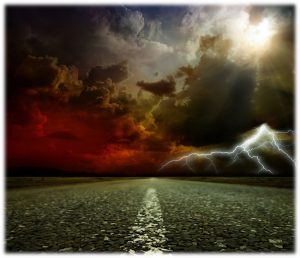EZRA 6: THE FUTILITY OF WORRY

After her brother’s death, our oldest daughter reminded us of the Soren Kierkegaard quote: “Life can only be understood backwards; but it must be lived forwards.” It’s easy with hindsight to flop back into your armchair and say, “Ok, now I understand why I had to go through that. Everything’s going to be all right now.” At the time however, when standing on the edge of that cliff, or walking that tight rope over one of life’s gaping holes, the outlook was dire and panic had overtaken peace.
While in 21st Century western society it may be difficult to fully feel the anxiety of a turbulent middle eastern world 25 centuries ago, human nature has changed little. In the movie The Book Thief, for example, books of culture and learning, history and faith, were publicly burnt in WWII Europe. The little girl in the movie may not have been trying to re-build a controversial Temple from a pile of ruins, but to save that one book from the flames was to risk her life! With unthinkable horror stories so close to our back door, we could be caught up in similar circumstances even in our own future. At the very least, we can all experience seasons of personal tsunamis that shattered dreams and crush one’s soul. But what’s the point of worry?
Well, for one thing, it’s an impossibility to suggest that we can stop worrying completely. Human images of the Creator God have been specifically designed to rule[a] and ruling means leadership command/control over our environment. In addition, and as long as we live in an unstable world, active pre-emptive concern is part of our basic design to rule and worry is a natural survival instinct that heightens our senses to something that is wrong, or could be wrong. The positive side of worry will help us weigh up the consequences ahead of time, then stop us from going into danger. While worry over the planet, for example, can mobilize us to prayer or action, trying to avoid worry (by steering away from negative information) only blinds us and causes us to “bury our head in the sand”!
 In the months and years leading up to the destruction of this Temple in Jerusalem that the people in today’s chapter were trying to rebuild, the prophets Ezekiel and Jeremiah seemed to be the only ones predicting a future problem, while everyone else had been predicting peace and prosperity.[b] Those “worried” enough by the warnings of God’s messengers could have made changes and preparations. But those who weren’t worried, kept going along in their headlong pursuit of humanistic advancement that eventually destroyed their known world.
In the months and years leading up to the destruction of this Temple in Jerusalem that the people in today’s chapter were trying to rebuild, the prophets Ezekiel and Jeremiah seemed to be the only ones predicting a future problem, while everyone else had been predicting peace and prosperity.[b] Those “worried” enough by the warnings of God’s messengers could have made changes and preparations. But those who weren’t worried, kept going along in their headlong pursuit of humanistic advancement that eventually destroyed their known world.
So then, in small doses, worry is good. But the negative side of worry either cripples us unnecessarily for moving forward, or else sends us into overdrive. Often, we worry because we think we’re in charge – that innate design to rule. The spot light is on us and we’re in the driving seat of our own lives. If I make a wrong turn, I’m at fault. If I don’t work, I’ll not eat. If I don’t push myself forward, someone else will advance ahead of me.
 However, Trust is the antidote for worry and our Maker, Father God, wants us to trust in Him. This is why He has always told the story ahead of time. From the earliest encounters with the Creator God, life has not been understood backwards – as the Soren Kierkegaard quote suggests. From the beginning, the Creator God has explained the script before His people took their places on the stage – just as any good Director and Producer would.
However, Trust is the antidote for worry and our Maker, Father God, wants us to trust in Him. This is why He has always told the story ahead of time. From the earliest encounters with the Creator God, life has not been understood backwards – as the Soren Kierkegaard quote suggests. From the beginning, the Creator God has explained the script before His people took their places on the stage – just as any good Director and Producer would.
Noah, for example, knew that a flood was coming 100 years before and he built a football-pitch-size Ark during that time.[c] Abraham, was told where his life would lead – that all nations on earth would be blessed through him.[d] He worked through the difficulties of his present circumstances based on the information given to him about his future.[e] His whole family (four generations down) knew that they would go into slavery for 400 years[f] and that their brother Ephraim would become a multitude of nations.[g] Even their current demise, in today’s chapter, was explained to them in excruciating detail a millennium earlier, in days of Moses.[h]
 When the people in today’s chapter had already been told that the Lord will grant that the enemies who rise up against them will be defeated (i.e. they’ll come at His people from one direction but flee from them in seven[i]), they shouldn’t have been at all surprised with the outcome in today’s chapter. [v1-12] If the Lord God of Creation changes times and seasons; deposes kings and raises up others; and gives wisdom to the wise and knowledge to the discerning[j], such information only highlights the futility of worry.
When the people in today’s chapter had already been told that the Lord will grant that the enemies who rise up against them will be defeated (i.e. they’ll come at His people from one direction but flee from them in seven[i]), they shouldn’t have been at all surprised with the outcome in today’s chapter. [v1-12] If the Lord God of Creation changes times and seasons; deposes kings and raises up others; and gives wisdom to the wise and knowledge to the discerning[j], such information only highlights the futility of worry.
Therefore, God’s people understand life looking forward to what our Maker has already told us in the Creator’s Handbook for Life – our manufacturer’s guidebook. We’re to live today, and process our present, in light of what we’ve been told is ahead; but this doesn’t negate the nail-biting roller-coaster ride that we have in trusting Him. When I stood dialling the emergency services on the morning our son passed away, I couldn’t help but say, “Ok God, what are you doing. I know you’re up to something. Tell me what you’re doing.”
 Faith is not without the anxious cliff-hangers. There’s a lot of empty space beneath us when we’re carried on eagle’s wings![k] Although our Maker renews our strength, flying against the wind, running uphill, and walking knee-deep in mud, is still difficult and confusing at times.[l] But when we’re specifically told not to worry, it was because our Father in Heaven knows what we need.[m] From where He sits, He can see around the next corner. He knows what’s ahead; and if we care to read what He’s said, we’ll know what’s ahead too.
Faith is not without the anxious cliff-hangers. There’s a lot of empty space beneath us when we’re carried on eagle’s wings![k] Although our Maker renews our strength, flying against the wind, running uphill, and walking knee-deep in mud, is still difficult and confusing at times.[l] But when we’re specifically told not to worry, it was because our Father in Heaven knows what we need.[m] From where He sits, He can see around the next corner. He knows what’s ahead; and if we care to read what He’s said, we’ll know what’s ahead too.
And so, the storm in today’s chapter blew over as predicted. Work began again and, under the preaching of Haggai the prophet and Zechariah, life returned to a level of normality. [v13-15] With the centre of the community restored to their Maker, the community celebrations began again and the timing of the first of these, was no coincidence.
It’s no small thing to note that as soon as the Temple was dedicated (and up and running) the Passover was the first festival on the calendar. This was the celebration that brought the nation of Israel into being – the night they left Egypt to become a holy nation, a people belonging to God.[n] After 70 years in exile due to centuries of bad behaviour, the sun had returned after the rain. [v19-21] Springtime had returned with His children, and the Creator’s family were back seeking Him once more. Now all His parental worries were, for a time, laid aside and they celebrated with Him while filled with great joy. [v22]
CLICK to return to today’s “Daily Breadcrumbs”
[a] Genesis 1:26-28
[b] Ezekiel 13:10,16 and Jeremiah 6:14,8:11
[c] Genesis 5:32 compared to Genesis 7:6
[d] Genesis 18:18 and 22:18
[e] Genesis 12:2-3 and 15:1-6
[f] Genesis 15:13
[g] Genesis 48:19 (Context v12-22)
[h] Deuteronomy 28:15-68
[i] Deuteronomy 28:7
[j] Daniel 2:21
[k] Exodus 19:4
[l] Isaiah 40:31
[m] Matthew 6:25-34
[n] Exodus c12